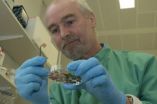(Press-News.org) New research from the University of Southampton has shown that copper can prevent horizontal transmission of genes, which has contributed to the increasing number of antibiotic-resistant infections worldwide.
Horizontal gene transfer (HGT) in bacteria is largely responsible for the development of antibiotic-resistance, which has led to an increasing number of difficult-to-treat healthcare-associated infections (HCAIs).
The newly-published paper, which appears in the journal mBio, shows that while HGT can take place in the environment, on frequently-touched surfaces, such as door handles, trolleys and tables, which are made from stainless steel – copper prevents this process from occurring and rapidly kills bacteria on contact.
Lead author Professor Bill Keevil, Chair in Environmental Healthcare at the University of Southampton, explains: "Whilst studies have focussed on HGT in vivo (an experiment that is done in the body of a living organism), this work investigates whether the ability of pathogens to persist in the environment, particularly on touch surfaces, may also play an important role. Here we show prolonged survival of multidrug resistant Escherichia coli and Klebsiella pneumoniae on stainless steel surfaces for several weeks. However, rapid death of both antibiotic-resistant strains and destruction of plasmid and genomic DNA was observed on copper and copper alloy surfaces, which could be useful in the prevention of infection spread and gene transfer."
Showing that horizontal transmission of genes (for example, those governing antibiotic resistance) occurs on touch surfaces, supports the important role of the environment in infection prevention.
Professor Keevil summarises: "We know many human pathogens survive for long periods in the hospital environment and can lead to infection, expensive treatment, blocked beds and death. What we have shown in this work is the potential for strategically-placed antimicrobial copper touch surfaces to not only break the chain of contamination, but also actively reduce the risk of antibiotic resistance developing at the same time. Provided adequate cleaning continues in critical environments, copper can be employed as an important additional tool in the fight against pathogens."
Beyond the healthcare environment, copper also has a wider role to play in infection control. Professor Keevil explains: "Copper touch surfaces have promise for preventing antibiotic resistance transfer in public buildings and mass transportation systems, which lead to local and – in the case of jet travel – rapid worldwide dissemination of multi-drug resistant superbugs as soon as they appear.
"People with inadequate hand hygiene could exchange their bugs and different antibiotic resistance genes just by touching a stair rail or door handle, ready to be picked up by someone else and passed on. Copper substantially reduces and restricts the spread of these infections, making an important contribution to improved hygiene and, consequently, health."
Installations of copper touch surfaces have already taken place across the UK and around the world, harnessing copper's ability to continuously reduce bioburden and consequently the risk of HCAI transmission. This research offers additional evidence to deploy copper (and copper-containing alloys that benefit from the metal's antimicrobial properties) in the form of touch surfaces to provide extra protection alongside standard hygiene practices.
INFORMATION:
New study shows how copper restricts the spread of global antibiotic-resistant infections
2012-12-04
ELSE PRESS RELEASES FROM THIS DATE:
Metabolic biomarkers for preventive molecular medicine
2012-12-04
One of the big challenges of biomedicine is understanding the origin of illnesses in order to improve early detection and significantly increase recovery rates, as well as being able to do what CNIO researchers call preventive molecular medicine, which consists of identifying those individuals who have a greater molecular risk of suffering certain pathologies in order to prevent them. The ageing of the organism, and therefore of the cells and tissues it is made of, represents the greatest risk factor for the majority of developed-world illnesses, including cancer.
A team ...
Carnegie debuts revolutionary biosphere mapping capability at AGU
2012-12-04
San Francisco, CA —Researchers from the Carnegie Institution are rolling out results from the new Airborne Taxonomic Mapping System, or AToMS, for the first time at the American Geophysical Union (AGU) meetings in San Francisco. The groundbreaking technology and its scientific observations are uncovering a previously invisible ecological world. To watch a video about how AToMS is helping researchers look at the world in a whole new way, click here.
AToMS, which launched in June 2011, uniquely combines laser and spectral imaging instrumentation onboard a twin-engine aircraft ...
African savannah -- and its lions -- declining at alarming rates
2012-12-04
DURHAM, NC -- About 75 percent of Africa's savannahs and more than two-thirds of the lion population once estimated to live there have disappeared in the last 50 years, according to a study published this week in the journal Biodiversity and Conservation.
The study, led by Duke University researchers, estimates the number of lions now living on the savannahs to be as low as 32,000, down from nearly 100,000 in 1960. Lion populations in West Africa have experienced the greatest declines.
"The word savannah conjures up visions of vast open plains teeming with wildlife. ...
Driverless vehicles expected to navigate intersection of safety, speed
2012-12-04
How do driverless vehicles navigate through intersections? Faster and safer than if humans were in charge, according to researchers with the Virginia Tech Transportation Institute.
Autonomous vehicles will turn themselves over to an automated intersection controller, which adjusts the trajectory and speed of the vehicles to prevent crashes, said Ismail Zohdy of Cairo, Egypt, a Ph.D. student in civil engineering at Virginia Tech, and Hesham Rakha, director of the Center for Sustainable Mobility at the transportation institute and professor of civil engineering at the university. ...
New method for creating long-lived stem cells used for bone replacement
2012-12-04
New Rochelle, NY, December 4, 2012—Human mesenchymal stem cells (hMSCs) can develop into bone cells and are useful for tissue engineering and regeneration. However, when grown in the laboratory they quickly lose their ability to continue dividing and they die. A method for genetically engineering hMSCs so they become immortal and still retain their ability to become bone cells is described in an article published in BioResearch Open Access, a bimonthly peer-reviewed journal from Mary Ann Liebert, Inc., publishers. The article is available free on the BioResearch Open Access ...
Nanotechnology drug delivery shows promise for treatment of pediatric cancer
2012-12-04
Wilmington, DE – This month, Molecular Pharmaceutics reported promising findings from the Nemours Center for Childhood Cancer Research and the Materials Science and Engineering Department at the University of Delaware, about the potential for nanotechnology to deliver chemotherapeutic agents in a way that attacks cancer cells without harming healthy cells. To date, nanoparticle-based drug delivery approaches have been poorly developed for the treatment of childhood leukemia, which comprises 30% of childhood cancers. In the Nemours study, encapsulated dexamethasone ("dex") ...
Study finds prioritizing rather than canvassing entire plant genome may lead to improved crops
2012-12-04
MANHATTAN, Kan. -- A new study may help scientists produce better climate-resistant corn and other food production plants by putting a spin on the notion that we are what we eat.
Kansas State University geneticists and colleagues found that by applying a genetic-analysis method used to study and prioritize the genes in humans, it improved the likelihood of finding critical genes in food production plants. These genes control quantitate traits in plants, such as how the plants grow and when they flower.
Additionally, this method can be used to study how food production ...
Emergency physician's loss sparks advocacy
2012-12-04
Boston – Jonathan Welch, MD, a physician in the Department of Emergency Medicine at Brigham and Women's Hospital, never thought his family would be part of a medical error. But when his mother's battle with cancer took a sudden turn and she was rushed to a community hospital in Wisconsin, Welch watched in helpless horror as a series of mistakes lead to her death. After the funeral, he encouraged the Wisconsin hospital's administrators to make changes to avoid future errors and deaths, but his experience proved frustrating and fruitless. Now, in an essay that appears ...
Study: Parents key to preventing alcohol, marijuana use by kids
2012-12-04
New research from North Carolina State University, Brigham Young University and the Pennsylvania State University finds that parental involvement is more important than the school environment when it comes to preventing or limiting alcohol and marijuana use by children.
"Parents play an important role in shaping the decisions their children make when it comes to alcohol and marijuana," says Dr. Toby Parcel, a professor of sociology at NC State and co-author of a paper on the work. "To be clear, school programs that address alcohol and marijuana use are definitely valuable, ...
Working towards happiness
2012-12-04
Raising the retirement age to increase financial stability does not make men worse off psychologically in the long-run, according to a new study by Dr. Elizabeth Mokyr Horner, from the University of California, Berkeley in the US. Her work shows that individuals go through the same psychological stages as they adjust to retirement, with life satisfaction stabilizing after 70, irrespective of how old they are when they retire. The study is published online in Springer's Journal of Happiness Studies.
As we live longer, the size of the retired population relative to that ...


